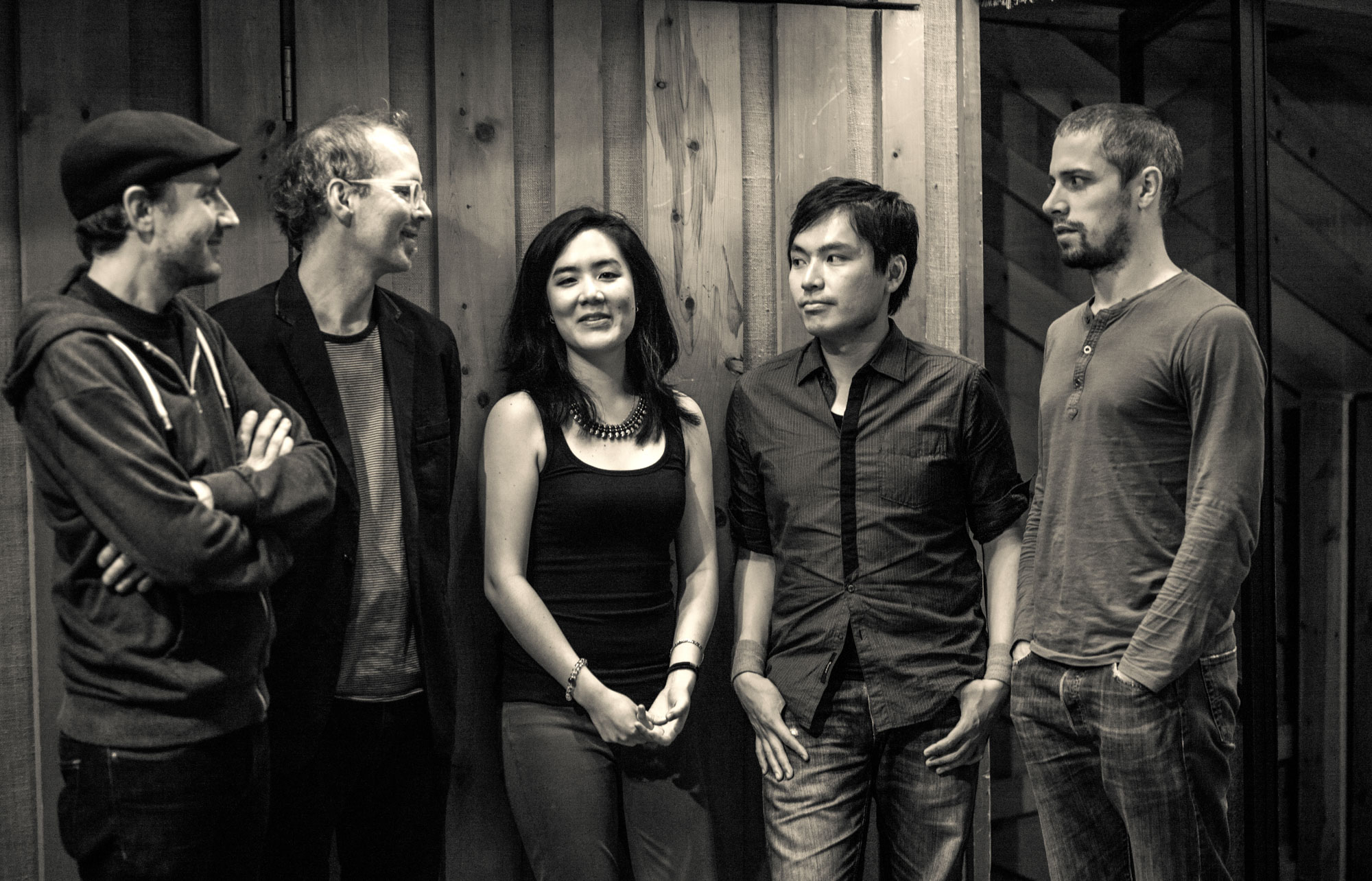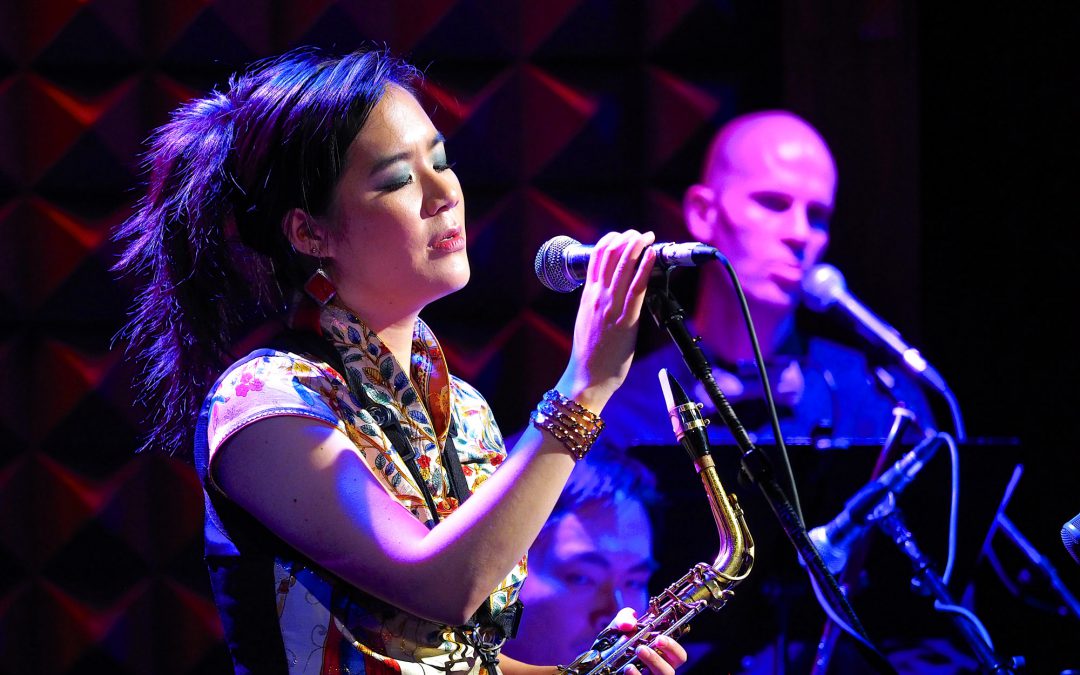Taiwanese American Stephanie Chou is a saxophonist, singer, and composer based in New York City, whose music combines classical and Chinese influences with jazz and pop harmonies and rhythms. Stephanie has performed her music across the world – from Taipei and Beijing to NYC and Italy – and seeks to produce “global music that is artistically challenging, bold and fearless, and which presents a unique musical perspective.”
She recently released her third album, Asymptote, which features Taiwanese erhu virtuoso Andy Lin on arrangements of Chinese classics such as “The Moon Represents My Heart” and “Kangding Love Song.”
TAP-NY had the chance to ask her some questions despite her busy schedule. For those interested, Stephanie’s next show is on May 5th at the Flushing Town Hall for their “Taiwan Meets Jamaica” installment of their Global Mashup series.
What was your upbringing like, and when did you begin your musical journey?
I was born in NYC and grew up in Irvington. My mother grew up in Taiwan and my father is Chinese-American. After attending the Horace Mann School, I graduated from Columbia University with a BA in Mathematics, and also took graduate classes in music composition at the City College of New York.
I studied classical piano for ~15 years during grade school, have been playing saxophone for nearly 20 years, and have been singing for the last 6 years. I have a strong interest and background in classical piano and saxophone, and in college became interested in jazz and improvisation.
The moment when I knew I wanted to pursue music professionally actually occurred, oddly enough, during a summer I spent studying abroad in Beijing in 2007. For 3 months, I was taking Chinese classes during the day and playing in bars and clubs with local musicians (some ex-pats from the US, some local Beijingers) at night. For the first time ever, I had experienced the power of music to connect people who don’t speak the same language. I always loved playing, but that experience changed my relationship to music. When I came back to NY, I started pursuing it as a career.
In a different life, what would you be doing instead of composing music?
In another dream life, I would be a professional big-mountain skier!

Recording “Compass” with Octavia Romano. Photo by Sergio Reyes
You studied both math and music at Columbia, your Twitter bio describes you as “Saxophonist, Composer, Vocalist, Mathematician.” All three of your albums relate to math concepts. What role does math play in your musical works – and how did this combination begin?
Math certainly informs music. The influence of math in my compositions is more along the abstract end of the spectrum. Some extremely rigorous composition techniques rely on mathematical concepts for their core, but in general my use of math is more suggestive or abstract. For “Prime Knot,” I related various arrangements of the Chinese traditional song “Jasmine Flower” to various types of mathematical knots, topological objects with cool properties I like. A few other songs from that album (Uniform Convergence, for example), are musical interpretations of what I think those mathematical concepts represent. “Compass” does not have mathematical influences in the compositions aside from perhaps the title, though you’re the first person to have brought it up in that context! For “Asymptote”, the title track is a metaphor between asymptotes – two lines or curves that come infinitely close together but never actually touch – and people.
How does your upbringing and cultural heritage influence your musical style?
Most of the source material for my latest album came from Chinese-related music and culture I was exposed to at a young age. I drew from poems I learned in Chinese school, tongue-twisters my grandparents taught me, recordings of guzheng pieces my mother used to play for me when she was driving me to various after-school activities, folk songs I loved – things that were so ingrained in my mind as a young kid that I’ve never forgotten them. The source material was what was “most obvious” to choose for me, what I remember the most from my early years. Chinese music was always a part of what we listened to with my family. I did not really think of using it as a source of inspiration for my own compositions until maybe 2011. We mostly listened to traditional zither, folk songs, occasionally some Peking Opera with my grandparents, and Chinese School friends or my cousins would show me some mandopop. I actually did not know much erhu music until I met Andy Lin in 2009.

Steph Chou by Emra Islek
When I write arrangements of Chinese folk songs or take elements from Chinese culture and expand their arrangements, my goal is to blend those existing works with my own musical ideas – to modernize them through a new perspective. The pop, classical, and jazz influences are just “my twist” on those songs. The music’s combination of eastern and western traditions parallels my own multi-cultural upbringing, and it was a way for me to explore my roots while contributing something unique.
My goal is to create global music that is artistically challenging, bold and fearless, and which presents a unique musical perspective. For those listeners who have some background in Chinese culture and know some of the references, I hope they feel the songs provide a fresh perspective on something they are already familiar with. For listeners for whom the source material is completely new, I hope the music provides an interesting gateway into Chinese culture. Above all, I hope listeners find the music to be intriguing, inventive, and informative.
Can you talk about a significant memory or your favorite experience in Taiwan?
Until I was 13 or 14 years old, I spent every summer in Taipei visiting my grandparents, so I have many fond memories of Taiwan. Some of my favorites:
- Pineapple cakes. You cannot go to Taiwan and not have feng li su. We bring them back to NY whenever we go, and now my Mom goes more frequently than I do, so she always brings some back for me and my sister. Sometimes I freeze them so I can eat them year round.
- All of the food in general. It’s tastier, fresher, healthier, cheaper. Don’t get me started on the food, because I won’t stop!
- Xiao Ren Guo was one of my favorite places as a kid. I loved the miniature worlds they created and wanted to go there every visit.
- Shopping with my mom for all sorts of clothing that just fit me better than what I could find in the US, and was way cheaper.
- Playing shows at Sappho and Marsalis Home with local Taiwan musicians – connecting with musicians and a local audience
- And perhaps my fondest – walking the palm-tree lined streets of Taipei with my grandparents. Visiting Tai Da, my mom’s college, and Yi Nu Zhong, my mom’s high school. Waking up every morning and being so excited for my grandfather to take me to the street vendor on the corner who made eggs. I couldn’t believe that people normally bought their morning fried eggs, xi fan, and you tiao from a street vendor; the idea of buying one cooked egg at a time was amazing to my young self. I’d always ask my grandfather to take me to get he bao dan, and it became our ritual.
What’s a concept you’d like to work on in the future?
I was recently awarded a 2016 Jerome Fund for New Music – a grant from the American Composers Forum with funds provided by the Jerome Foundation to write, record, and premiere a new piece of music with China Institute. The new piece, Comfort Girl, will be a musical exploration of comfort women, Asian victims abducted into sexual slavery by the Japanese Army in WWII.
Who’s your favorite artist, or what’s your favorite song and why?
That’s always a hard question because there are so many favorites. Growing up, I loved – Debussy, Chopin, Rachmaninoff, composers who wrote for classical saxophone like Desenclos and Creston, Simon and Garfunkel, the Carpenters, the Beatles, Carole King, Wang Chang Yuan (a Chinese zither player), Charlie Parker, Miles Davis, John Coltrane, Carlo Gesualdo, and many rock and pop bands of the time like Incubus, Matchbox Twenty, and Mariah Carey. But there’s so much music out there that I love and that I’ve spent time exploring, my list of “favorites” keeps expanding every day.
Can you explain the story behind your Instagram handle?
“Scaltoids55” was my screen name for my first AIM and AOL accounts, which I created when I was in middle school and eating altoids constantly. I just kept it for my Instagram handle!

Recording by Emra Islek
Do you have any advice for an aspiring musician?
Instead of writing any advice about how to improve at your craft – which one should be striving for daily – I thought I’d comment on what to focus on from a more broad perspective. My general advice would be – figure out as soon as possible what you want musically, what kind of career you want, and what kind of life you want. Do you want to compose for other people? Perform? Be a bandleader? Be a sideman? Tour a lot? Not tour at all? Play 200 concerts a year? Play 5 concerts a year? Teach others? Write only what kind of music you want to write? etc – try to figure out what kind of music you want to focus on – and go for that. The sooner you can come up with more specific goals, the easier it will be to reach them.
Header image credits to Michael Yu

